University of Oregon Dropbox Service Shifts to Limited Storage
Quota at 100GB per person
This is a Press Release edited by StorageNewsletter.com on April 1, 2024 at 2:02 pmPeople who use the University of Oregon’s (UO) Dropbox, Inc.‘s service got a surprise on March 26 when they learned about a new storage limit.

That day, moving quickly to avert an emerging service crisis, Information Services had set the new Dropbox storage quota at 100GB per person. That action helped prevent an impending storage overrun that could have frozen the Dropbox service for the entire university.
“We realize this was an abrupt and significant change, and we apologize for any inconvenience,” said Abhijit Pandit, VP and chief information officer. “We know many of you rely on Dropbox for storing files and collaborating across institutions, and I can reassure you that those functions remain intact.”
During the UO’s recent contract renewal process with Dropbox, the company unexpectedly increased the cost of its unlimited storage offering by 70%, leading the UO into a more limited contract with only 1PB of total storage. That took effect on March 12.
Within 9 days, UO’s Dropbox use had increased to nearly 91% of capacity, leaving information services staff concerned about exceeding the limit. Staff started doing targeted outreach to the top Dropbox users, then instituted the quota and sent email notifications to all active Dropbox users.
“The vendor put us in a position of needing to react quickly,” said Jeff Jones, director of digital work experience. “We strive to plan and communicate technology changes in advance to minimize impacts to the UO community, but this situation provided little room to move.”
As of March 27, UO’s Dropbox storage usage had declined to the more manageable level of 81%.
“Many thanks to everyone who has deleted unneeded data from Dropbox,” Jones said. “Your efforts have helped ensure this service will continue to work for everyone.”
With the costs of many cloud-based services increasing, Pandit and others emphasized that staff are actively exploring a variety of storage options for people who need high-capacity storage, including continuing to discuss licensing terms and costs with Dropbox.
The university’s existing Microsoft SharePoint and Teams services continue to serve an important role, offering 5TB of secure storage per site, as does OneDrive, which offers 1TB of secure storage per person.
Although recent announcements from information services mentioned external drives and departmental file shares as other alternatives to Dropbox, staff strongly discourage their use for storing UO data due to concerns about data breaches, data loss and storage capacity limitations.
Information services staff have started reaching out to UO faculty and staff who store large volumes of data to learn more about their needs.
“We ask for everyone’s patience as we work to collaboratively navigate this situation,” said Pandit. “There is no need for panic because we’ve been able to stabilize the situation. We’ll provide more updates to the UO community in the coming weeks.”
In the meantime, staff provided answers to several common questions about the new Dropbox quota:
• No data will be deleted.
• Information services is extending a temporary grace period to all UO Dropbox users – one of several steps taken from the outset to minimize impacts. That means even people who exceed 100GB of storage can continue to open, edit, sync and add files to Dropbox. A date for quota enforcement hasn’t yet been set.
• Some Dropbox users are receiving automated notifications from Dropbox saying their accounts are full. Those notifications can be ignored.
The Dropbox FAQ in the UO Service Portal provides more information. Dropbox users can also check their Dropbox storage usage.
“We have staff ready and available to help you,” said Gary Sullivan, senior director of user support services. “Our team is committed to supporting the UO community.“
Anyone who needs help managing files, exploring alternative storage options or switching services can submit a ticket at Dropbox support in the UO Service Portal or contact the IT staff who support their unit or the Technology Service Desk.















 Subscribe to our free daily newsletter
Subscribe to our free daily newsletter

